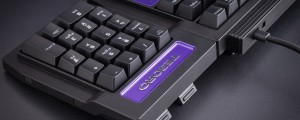
SAPPHIRE recently announced the Radeon HD6670 Low Profile GPU and sent one to Icrontic for review. Now, being the skeptical sort, I could not help but wonder if this unassuming and small card could do what a normal HD6670 can do. After all, there’s no external power supply connection on the card, it’s tiny, and it’s a single slot wide. Normally, these physical specs are reserved for low-budget, hobbled GPUs and aren’t considered enthusiast- or gamer-grade pieces of kit. The specs, however, stand up:
- 480 Stream processors
- 40nm ‘Turks’ GPU core
- 1GB GDDR5
- 800mhz Core Clock
- 1x Dual-Link DVI port
- 1x HDMI 1.4a port
- 1x D-Sub VGA port (optional with ribbon cable)
- No external power necessary
- Single slot cooler
- Low profile bracket standard
- Full profile bracked included (optional)
- UVD—3rd generation Universal Video Decoder (Blu-Ray 3D support)
- Stereoscopic 3D output
- CrossFire compatible, and works for Dual Graphics in APU systems
- AMD APP Acceleration—Accelerated processing with Stream Processors
So what we’re looking at is literally just a physical shrink with some of SAPPHIRE’s magic cooling voodoo that enables this unique form factor for this GPU family. According to SAPPHIRE, this is currently the only low-profile, single-slot Radeon HD6670 available.
The SAPPHIRE Radeon HD6670 will, unfortunately, not support Eyefinity since there is no Displayport, even though the GPU is technically capable of it. You can do dual monitors (one through HDMI and one through DVI), but three is out of the question. As the specs show, the HD6670 supports UVD3 (Unified Video Decoder 3) which allows hardware acceleration of your video content, including Blu-ray and Flash. If you use a current browser (IE 9, Chrome 15, Firefox 8), the 6670 will offload some of the rendering to the GPU.
Another feature worth mentioning is the low active power consumption and AMD’s Dynamic Power Management—when the GPU is idle or delivering 2D content, it’s barely using any power at all.
The card comes put together with a low-profile bracket. The full-size bracket is bundled with it and is a simple matter of removing three screws to switch over to the large plate. The analog D-Sub VGA port is bundled separately but just plugs right into the board with a ribbon cable and has a space in the large bracket, or can be installed in a second case slot for low-profile setups.
But will it play …. Battlefield 3?
They all play Crysis nowadays. Get over it. The joke is old, so we’ll just go ahead and fire up Battlefield 3. People who are looking to get into Battlefield 3 on a budget are going to be eyeballing this range of cards heavily, so I ran through Operation Swordbreaker on the HD6670, from the point where you disable the IED to the end of the mission. It’s hectic, there are lots of lighting situations, gunfire, and a variety of backgrounds and lots of moving characters on-screen. Here were the FPS numbers as captured by FRAPS. The settings for BF3 were as follows:

And now the numbers:
As you can see, the game hovers right around 30fps—perfectly playable at 1920×1200. Pretty remarkable for a low-power card.
Now, for the other big game everyone’s talking about:
Will it play Skyrim?
The short answer is, yes, absolutely. And it looks pretty damned good while doing it.
Here are the settings used for the test: High enough to be gorgeous. Not max, but definitely better than consoles, and better than “good enough”:
Here are the numbers; I ran around the town of Whiterun, paying special attention to the fountains and smoking sconces as well as trying to get camera views with many people walking around.
As you can see, on medium-high settings, Skyrim is perfectly playable at a pretty steady 30fps; it dips down to 23-25 when there was heavy smoke effects on-screen.
Benchmarks
For these types of cards, I opt to test under “real world” conditions since this is not the top-tier enthusiast kit. This is a card for normal people with normal budgets and normal desktop PCs. Therefore, the test system is running background tasks, and is not super-tweaked specifically for benchmarking. I feel this is a more accurate approach because it’s going to give performance numbers very similar to what an average consumer would experience if purchasing this card for their own PC.
The benchmark system itself is modest—an AMD Phenom II X4 965 on an ECS A890GXM-A with 4gb of DDR3 and a WD Raptor 10K SATA drive, running Windows 7 64-bit with Service Pack 1.
UNIGINE HEAVEN 2.5
(Settings: DirectX 11, Shaders High, Tesselation Normal, Anisotropy 2, Anti-Aliasing 2x, 1920×1200)
Unigine Heaven is a thorough DirectX 11-focused benchmark. It makes heavy use of tessellation as well as lots of ambient occlusion and dynamic lighting. The SAPPHIRE Radeon HD 6670 chugs through the tougher parts of the benchmark; it doesn’t really compare to higher-end GPUs on this test.
- FPS: 12.2
- Scores: 308
- Min FPS: 5.8
- Max FPS: 24.6
3DMARK 11
(Settings: Basic benchmark, Performance mode, 1280×720)
3DMark 11 is a standardized DirectX 11 benchmark that tests both CPU and GPU performance. It’s not super important at the mid-range because, again, we’re not talking about high-end enthusiast cards here, but this test does push the GPU and provide a nice, at-a-glance aggregate score.
- P1755
- Graphics Score 1590
- Physics Score 4044
- Combined Score 1641
- GraphicsTest 18.28 FPS
- GraphicsTest 27.7 FPS
- GraphicsTest 39.19 FPS
- GraphicsTest 44.57 FPS
- PhysicsTest 12.84 FPS
- CombinedTest 7.64 FPS
Use case
 This is, in essence, a perfect GPU for a home theater PC. It’s low profile, low power, and single-slot. It will decode any modern media perfectly, and it can even play games on your big screen TV better than a Xbox 360 or PlayStation 3. You can tell your spouse that you’re building a nice HTPC so that you can cuddle up on the couch together; no need to tell them that it will also play Skyrim beautifully at 1080p.
This is, in essence, a perfect GPU for a home theater PC. It’s low profile, low power, and single-slot. It will decode any modern media perfectly, and it can even play games on your big screen TV better than a Xbox 360 or PlayStation 3. You can tell your spouse that you’re building a nice HTPC so that you can cuddle up on the couch together; no need to tell them that it will also play Skyrim beautifully at 1080p.
It would also be a fantastic drop-in upgrade for a system using an AMD Fusion APU, since Crossfire will kick in and help increase your performance.
SAPPHIRE has always set themselves apart from other GPU manufacturers; with each card they try to provide at least one unique feature, and they’ve done it again with the low profile Radeon HD6670. If you want to build an inexpensive media PC or just upgrade an aging PC with a very low power card that won’t require you to purchase a new power supply, the low profile Radeon HD6670 might be the only card that fits the bill perfectly.
SAPPHIRE never fails to disappoint. We’re happy to award this card the Icrontic Stamp of Approval for providing unique features in a sea of same cards.
The SAPPHIRE Radeon HD6670 retails for $99.99 and is available at Newegg now.














 Articles RSS
Articles RSS